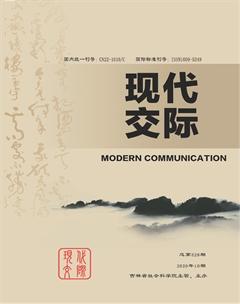制约英语主动语态变成被动语态的因素
刘发金
摘要:英语中,英语的主动语态表明句子主语是动作行为的发出者。需要强调或突出动作执行者时,就用主动语态。现实中,主动语态比被动语语态使用频率高。被动语态表明句子主语是接受或承接谓语动词表示的动作。当出现需要突出动作承受者、动作承受者不明确、考虑到礼貌、措辞或句子主语太长等情况时,就必须使用被动语态。理论上,及物动词都有主动语态和被动语态两种形式,并且可根据语体、表达需要、强调的重点等选择使用不同的语态,主动语态也都可以转变为被动语态,主动语态和被动语态相互对应,同一意思可用两种语态来表达,但现实情况并非如此。由于受动词含义、宾语、意义、语体、话题、想象性等内容的限制,部分英语主动语态的句子是不能变成被动语态的,这一语法现象应加以注意。
关键词:制约 主动语态 被动语态 转换
中图分类号:H314 文献标识码:A 文章编号:1009-5349(2020)10-0210-03
英语中,英语主动语态和被动语态在大多数情况下可以相互对应。理论上讲,所有及物动词的主动语态都可以变成被动语态,但实际应用中,因为动词、宾语、意义、话题、中心、语体和语境等的制约,有些主动语态不能变成被动语态。
一、制约因素
1.动词意义的限制
(1)在某些特定意义上,一些表示相对静止状态的动词的主动语态不能变成被动语态。这类动词大部分是表示“相互作用”的动词(reciprocal verbs),比如表示“相象”的动词或短语,resemble,look like,equal,favour(to look like);表示“容纳”概念的动词及其反义词,contain,hold,comprise,lack;表示“适合”的动词,become,suit,fit,befit;表示“被占有”意义的动词,have,own,possess,retain,及last(to be enough for,够……之用),befall(to happen to发生,降临),fall,want[to be without;not have enough (of)缺乏],suffice [(esp.of food),satisfy 满足],fail(to be unsuccessful失败),mean(to intend打算),表示计量的动词,weigh,cost,last,own等。句子主语不是这些动词所表示动作的执行者,而且宾语不受动作的影响,不是动作的承受者。但若词义发生变化,则主动语态可变成被动语态。
The jeans do not become the boy.(becometo suit or to be suitable for合身;适合)
Mr Cliff Young prefers Beijing opera very much.(preferlike better更喜欢)
The Terras have two big houses in the center of the city.(haveto possess;own 拥有)
(2)不及物动词本来不能用于被动语态,但一些副词或介词与某些不及物动词相结合,构成短语动词,其中有些实际上相当于一个及物动词,则可以将主动语态变成被动语态。一个短语动词又可能有数个不同的含义,在某一意义上是不及物的,而在另一意义上是及物的,需仔细辨别;因为只有当它是及物的时,才能变成被动语态。这可以从下面例子中看出。
The daughter-in-law broke in with some fresh ideas of her own.
[break in(intransitive)to interrupt打断,插嘴]
Half an hour of drill in advance should be enough to break you in.
(Half an hour of drill in advance should be enough for you to be broken in.)
[break in(transitive)accustom to a certain activity or occurrence 使……适应某种活动或情况]
Jackson doesnt care for his new car.
[care for(intransitive)to like,or to want喜欢;想要]
The health authorities will care for his wife and son properly.
(His wife and son will be properly cared for by the health authorities.)
[care for(transitive)to be responsible for;to take care of负责;照顾]
(3)“动词+介词”构成的短语动词,通常既可以按其原有的字面意义使用,也可以按引申意义使用。通常只有按其引申意义解释时,才可以变成被动语态。
a.When the couple arrived at the bus stop,the bus was moving.
[arrive at to reach (a place)到達(某地)]
b.The couple quarrelled and quarrelled,but finally they arrived at a decision.
[arrive atto reach (a conclusion,a decision etc.达成,作出(结论、决定等)]
a.Must you look into my drawer?
b.Perhaps they were looking into a case at that time.(look into investigate调查)
上述每组a例是按照需要表达的意思,由“动词+介词”灵活搭配,且词义是“动词+介词”的原有字面意义,因此,不能变成被动语态。b例则不同,该短语是固定的习语,按短语动词的引申意义解释,因此,能变成被动语态。
(4)虽然谓语动词依然带有宾语,但某些“动词+名词”构成的动词短语,结构紧密,已成为不可割裂的整体,不能变成被动语态。常见的这类短语有:take place(发生),lose heart (灰心),speak ones mind(直率地发表意见),keep guard(放哨),keep ones word (守信),keep watch(监护),break ones word(失信、失言),have words(争吵、吵架); eat ones words(收回前言;承认说错);hold water(有道理),change hands(转手、易手)等。
The teacher changed her colour.
The house has changed hands many times last five years.
(5)在“及物动词+宾语+不带to的不定式”结构中,绝大部分适用于这一句型的动词都能变成被动语态,但是少数几个动词,如have,notice和watch等使役动词和知觉动词(verbs of perception)却不能变成被动语态,这在阅读和写作中应加以注意。
Parker is supposed to have his daughter repair the laptop.
×His daughter is supposed to be had to repair the laptop.
The crowd noticed the car slip off the road.×The car was noticed to slip off the road.
(6)表示“喜爱、厌恶、偏爱、致使”等意义的动词,如:beseech(恳求),bear(忍受、容忍),cause(使……遭受),get(使……),like(喜欢),love(热爱),prefer(更喜欢),promise(许诺),trouble(使苦恼、使忧虑),want(想要),wish(希望)等,后接一个“名词或代词+不定式”结构时,不能变成被动语态。
The old lady liked me to visit her.×I was liked to visit her.
The girl wished her boyfriend to have a merry Christmas Day.
×Her boyfriend was wished to have a merry Christmas Day.
(7)完成进行体和情态完成进行体的被动语态结构笨拙、别扭,使用频率低,因此,习惯上这两类完成进行体主动语态不需要变成被动语态,尽管句子结构正确,但极为罕见。
MrSmith has been teaching English in China for ten years.
?English has been being taught by MrSmith in China for ten years.
Pauls parents must have been persuading him the whole morning.
?Paul must have been being persuaded by his parents the whole morning.
2.宾语的限制
及物动词的宾语属于下面所列的词语或结构时,主动语态不能变成被动语态。
(1)反身代词和相互代词。
The lovely kid hurt himself on the face.
The twins are always helping each other with their homework.
For years the father and his son encouraged one another(each other).
(2)宾语是和动词意义相同的同源宾语。
Last week Mr Kevin died a sudden death.
The Chinese people are now living a happy life.
除同源宾语外,这类动词还可接其他宾语。在这种情况下,则可变成被动语态,但实际上用得比较少。
A company of foot(一连步兵)fought a great battle.
A great battle was fought(by a company of foot).
(3)宾语前有与主语有照应关系的物主限定词時,或者当宾语是执行者(即主语)身体的某一部位时,主动语态不能变成被动语态。
Mr Simonparked hiscar in the main square and left hastily.

